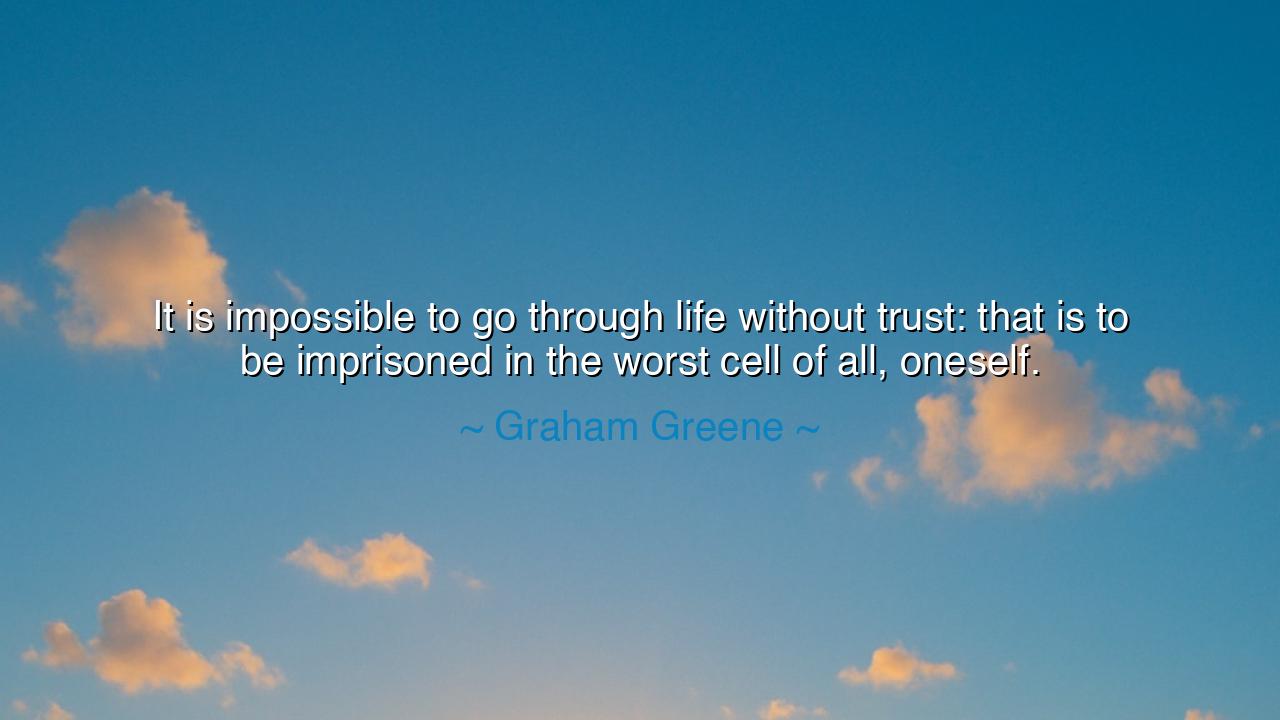
It is impossible to go through life without trust: that is to be
It is impossible to go through life without trust: that is to be imprisoned in the worst cell of all, oneself.






The words of Graham Greene—“It is impossible to go through life without trust: that is to be imprisoned in the worst cell of all, oneself”—carry the weight of a truth as old as humanity. In this brief but piercing statement, Greene unmasks the essential nature of trust: it is not a luxury, not a choice, but a necessity for life itself. To live without trust is to dwell in a prison of fear and suspicion, cut off from the warmth of others, isolated within the cold walls of one’s own doubt. For man is not fashioned to live as a solitary beast; he is made for relationship, for communion, for the mutual giving and receiving of confidence. Without trust, the soul shrivels, chained by its own suspicion.
The origin of this saying flows from Greene’s deep reflections on the human condition. A novelist who wrestled often with the struggles of faith, betrayal, and human weakness, Greene understood the fragile yet vital role of trust in binding men and women together. Having lived through wars, political turmoil, and personal betrayals, he saw that while mistrust can protect the heart from wounds, it also imprisons it in loneliness. Thus his words are both a warning and a lament: that a life without trust is a life without freedom.
History itself offers luminous examples of this truth. Consider the alliance between Franklin D. Roosevelt and Winston Churchill during World War II. The fate of nations rested not only on armies and weapons, but on the trust between two leaders who often disagreed, yet relied upon each other’s word. Without that trust, suspicion could have fractured the alliance, and tyranny might have triumphed. Their example shows us that trust is the mortar that holds together the stones of human effort; without it, the structure collapses.
At the same time, Greene’s words remind us of the tragedy that comes when trust is absent. Think of Richard Nixon and the Watergate scandal, where the loss of trust in leadership shook the very foundation of American democracy. In that moment, citizens found themselves doubting not only a man, but the very institutions of their government. The people’s faith was betrayed, and suspicion spread like a plague. It was a living image of Greene’s warning: when trust dies, men become imprisoned in cynicism, cut off from community, retreating into the narrow cell of the self.
The meaning of Greene’s words also reaches into the private life of every soul. To trust no one is to deny oneself friendship, love, and companionship. A marriage without trust is a cage; a friendship without trust is a hollow shell. And when a man closes himself off from all others, believing only in himself, he is not free but bound—bound to suspicion, bound to doubt, bound to the ceaseless labor of guarding his heart from imagined harm. In such a state, he becomes his own jailer, locked in the darkest prison of all.
The lesson is this: we must learn to risk trust. Yes, to trust is to be vulnerable, for betrayal is always possible. Yet to live without trust is a far greater wound, for it leaves the soul starved of connection. True wisdom lies not in refusing trust, but in discerning where to place it, and in cultivating trustworthiness within ourselves. If we wish others to open their hearts to us, we must be faithful stewards of their confidence, proving by our deeds that their trust is not misplaced.
Practically, let us begin with small acts. Keep your word, even when it costs you. Speak truth, even when silence would be easier. Extend trust, even cautiously, and allow yourself to be surprised by the goodness in others. When betrayed, do not retreat forever into suspicion, but rise again with discernment, offering trust where it can grow. In this way, life becomes not a prison of isolation, but a field where relationships, like seeds, take root and bear fruit.
Thus, Greene’s wisdom stands as a torch for all who fear the risks of the heart: “It is impossible to go through life without trust: that is to be imprisoned in the worst cell of all, oneself.” May these words remind us that the freedom we seek lies not in self-sufficiency alone, but in the courage to step beyond the walls of fear, to place our trust in others, and to build together the bonds that make life truly human.






AAdministratorAdministrator
Welcome, honored guests. Please leave a comment, we will respond soon